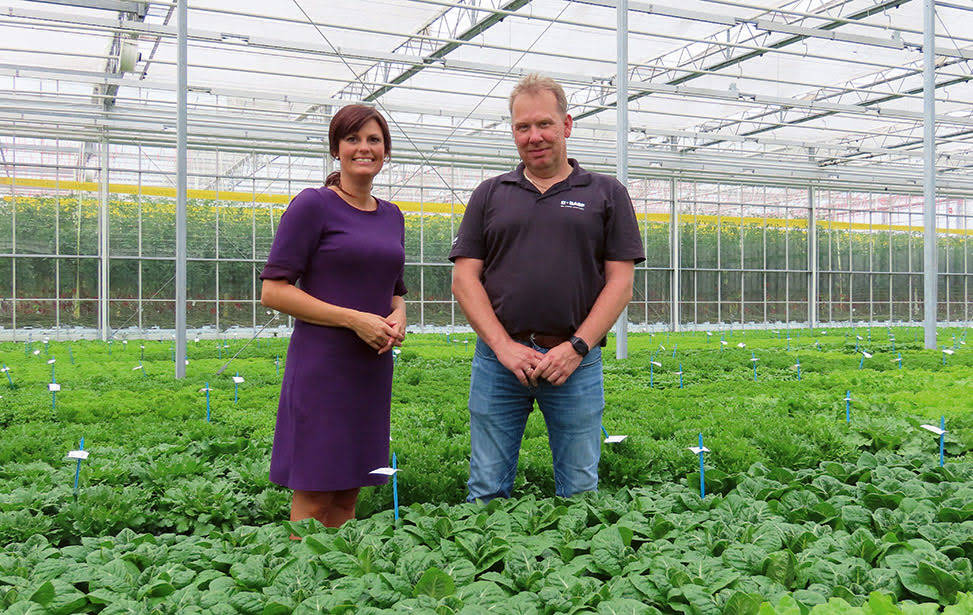- English

Together with corporate and academic partners, BASF Vegetable Seeds is making progress in the application of autonomous growing concepts. The company has already applied the concept to seed production, cultivation of a tomato variety and the screening of hydroponic lettuce varieties. A new project for cucumber is underway.
“At BASF Vegetable Seeds we want to make healthy eating enjoyable and sustainable. Therefore, we strongly believe in the development of a connected, data-driven, automated and sustainable production system with consumers’ needs in mind,” says Anne Jancic, Marketing & Business Development High Tech at BASF Vegetable Seeds.
In autonomous growing, sensors, cameras, data collection and analysis are used to predefine growing settings with the help of algorithms and artificial intelligence (AI). These integrated technologies can optimize inputs such as energy, water and the balance of nutritional elements to create the most optimal conditions for growth. They can recognize environmental conditions which will impact yield, the predictability of yield, better handling of crop diseases as well as future fruit quality, flavor or nutritional content of vegetables and take actions in real time. “Computers can make complex decisions much faster and learn based on outcomes much faster than we can,” adds Anne Jancic. “That does not mean that specialized growers are not needed anymore. It simply means that they will be able to do a better job using the opportunities offered by this technology.”
The goal is to provide a growing recipe for each variety BASF commercializes, Anne explains. “The grower can visualize the performance of the variety during growth from a simple dashboard and get real time digital feedback, enhancing the performance of our genetics and thus the profit of our customers.”
The benefits are manifold: Not only is the system highly reliable due to less human intervention, it also reduced the need to gain experience over several growing cycles or hiring specialists when growers start with a new crop. Less resources such as water and energy and a higher and more reliable production come with significant sustainability effects.
Progress in partnerships
As integrated concepts like these require an integrated approach, BASF is working together with industry suppliers, research institutes, growers and consultants.
Last year, BASF partnered with Hoogendoorn Growth Management to gain experiences with various autonomous growing software and hardware for hydroponic lettuce and tomato. The modular software ensures that the available resources such as natural gas, fertilizers and water are used as efficiently as possible, helping to minimize costs and CO² emissions and to maximize crop profitability.
“Next to the extremely huge learnings we made in modern climate management we’ve seen massive opportunities to improve our own processes and to add value to our genetics. Using the principles of Growing by Plant Empowerment (GPE) to control the plant balances and optimize photosynthetic activity, we were able to significantly increase the growth speed of hydroponic lettuce while improving crop quality at the same time,” explains Martin Voorberg, R&D Capital Investment Venture Manager at BASF Vegetable Seeds “We had the same experience with high-tech tomatoes when production was higher during the winter months compared to references from professional growers. As a consequence, we will increase our investments in the facilities at ‘s-Gravenzande to make all greenhouse compartments ready for autonomous growing.”
What is Plant Empowerment (PE)?
“Plant Empowerment is a step towards a sustainable and profitable cultivation, empowering the plants to produce their fruits in an efficient and sustainable way, balancing input and output – that’s what we also believe in for the future cultivation of vegetables,” explains Anne Jancic, Marketing & Business Development High Tech at BASF Vegetable Seeds. “We are developing powerful genetics for the professional horticulturalist and vegetable value chain. But getting the best out of those genetics and offering vegetables people love, is always a joint effort with the growers, greenhouse suppliers, universities and the whole industry. We believe that collaboration and synergies are key and contribute to developing even smarter innovations – autonomous growing and the movement towards a real smart greenhouse is one of the best examples for this.”